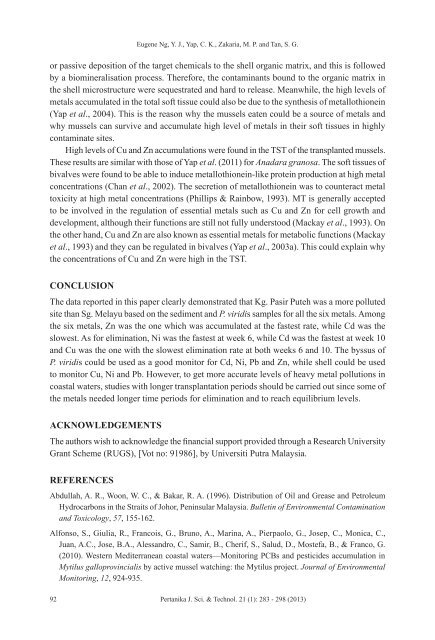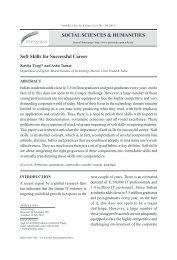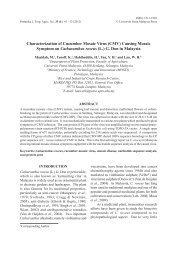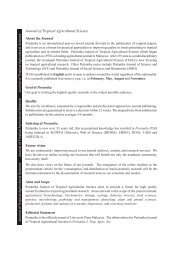Eugene Ng, Y. J., Yap, C. K., Zakaria, M. P. and Tan, S. G. or passive deposition of the target chemicals to the shell organic matrix, and this is followed by a biomineralisation process. Therefore, the contaminants bound to the organic matrix in the shell microstructure were sequestrated and hard to release. Meanwhile, the high levels of metals accumulated in the total soft tissue could also be due to the synthesis of metallothionein (Yap et al., 2004). This is the reason why the mussels eaten could be a source of metals and why mussels can survive and accumulate high level of metals in their soft tissues in highly contaminate sites. High levels of Cu and Zn accumulations were found in the TST of the transplanted mussels. These results are similar with those of Yap et al. (2011) for Anadara granosa. The soft tissues of bivalves were found to be able to induce metallothionein-like protein production at high metal concentrations (Chan et al., 2002). The secretion of metallothionein was to counteract metal toxicity at high metal concentrations (Phillips & Rainbow, 1993). MT is generally accepted to be involved in the regulation of essential metals such as Cu and Zn for cell growth and development, although their functions are still not fully understood (Mackay et al., 1993). On the other hand, Cu and Zn are also known as essential metals for metabolic functions (Mackay et al., 1993) and they can be regulated in bivalves (Yap et al., 2003a). This could explain why the concentrations of Cu and Zn were high in the TST. CONCLUSION The data reported in this paper clearly demonstrated that Kg. Pasir Puteh was a more polluted site than Sg. Melayu based on the sediment and P. viridis samples for all the six metals. Among the six metals, Zn was the one which was accumulated at the fastest rate, while Cd was the slowest. As for elimination, Ni was the fastest at week 6, while Cd was the fastest at week 10 and Cu was the one with the slowest elimination rate at both weeks 6 and 10. The byssus of P. viridis could be used as a good monitor for Cd, Ni, Pb and Zn, while shell could be used to monitor Cu, Ni and Pb. However, to get more accurate levels of heavy metal pollutions in coastal waters, studies with longer transplantation periods should be carried out since some of the metals needed longer time periods for elimination and to reach equilibrium levels. ACKNOWLEDGEMENTS The authors wish to acknowledge the financial support provided through a Research University Grant Scheme (RUGS), [Vot no: 91986], by <strong>Universiti</strong> <strong>Putra</strong> Malaysia. REFERENCES Abdullah, A. R., Woon, W. C., & Bakar, R. A. (1996). Distribution of Oil and Grease and Petroleum Hydrocarbons in the Straits of Johor, Peninsular Malaysia. Bulletin of Environmental Contamination and Toxicology, 57, 155-162. Alfonso, S., Giulia, R., Francois, G., Bruno, A., Marina, A., Pierpaolo, G., Josep, C., Monica, C., Juan, A.C., Jose, B.A., Alessandro, C., Samir, B., Cherif, S., Salud, D., Mostefa, B., & Franco, G. (2010). Western Mediterranean coastal waters—Monitoring PCBs and pesticides accumulation in Mytilus galloprovincialis by active mussel watching: the Mytilus project. <strong>Journal</strong> of Environmental Monitoring, 12, 924-935. 92 <strong>Pertanika</strong> J. Sci. & Technol. <strong>21</strong> (1): 283 - 298 (<strong>2013</strong>)
Assessment of Heavy Metal Pollution in the Straits of Johore by Using Transplanted Caged Mussel, Perna viridis Amiard, J. C., Amiard-Triquet, C., Barka, S., Pellerin, J., & Rainbow, P. S. (2006). Metallothioneins in aquatic invertebrates: their role in metal detoxification and their use as biomarkers. Aquatic Toxicology, 76, 160–202. Andres, S., Baudrimont, M., Lapaquellerie, Y., Ribeyre, F., Maillet, N., Latouche, C., & Boudou, A. (1999). Field transplantation of the freshwater bivalve Corbicula fluminea along a polymetallic contamination gradient (River Lot, France): I. Geochemical characteristics of the sampling sites and cadmium and zinc bioaccumulation kinetics. Environmental Toxicology and Chemistry, 18, 2462-2471. Bayen, S., Thomas, G. O., Lee, H. K., & Jeffrey, P. O. (2003). Organochlorine, pesticides and heavy metals in green-lipped mussel, Perna viridis in Singapore. Water, Air, and Soil Pollution, 155, 103-116. Behrens, W. J. & Duedall, I. W. (1981). The behaviour of heavy metals in transplanted hard clams, Mercenaria mercenaria. <strong>Journal</strong> du Conseil International pour l’Exploitation de la Mer, 39, 223-230. Burt, A., Maher, W., Roach, A., Krikowa, F., Honkoop, P., & Bayne, B. (2007). The accumulation of Zn, Se, Cd, and Pb and physiological condition of Anadara trapezia transplanted to a contamination gradient in Lake Macquarie, New South Wales, Australia. Marine Environmental Research, 64, 54–78. Chan, M. K., Othman, R., Zubir, D., & Salmijah, S. (2002). Induction of a putative metallothionein gene in the blood cockle, Anadara granosa, exposed to cadmium. Comparative Biochemistry and Physiology Part C, 131, 123-132. Department of Environment (1994). Environmental quality report, 1994. Ministry of Science, Technology and the Environment, Malaysia. Department of Environment (2007). Annual Report 2006. Ministry of Science, Technology and the Environment, Malaysia. Faverney, C. R., Guibbolini-Sabatier, M. E., & Francour, P. (2010). An ecotoxicological approach with transplanted mussels (Mytilus galloprovincialis) for assessing the impact of tyre reefs immersed along the NW Mediterranean Sea. Marine Environmental Research, 70, 87-94. Francesco, R., & Enzo, O. (1994). Acumulation and subcellular distribution of metals (Cu, Fe, Mn, Pb and Zn) in the Mediterranean mussel Mytilus galloprovincialis during a field transplant experiment. Marine Pollution Bulletin, 28(10), 592-600. Gabr, H. R., & Gab-Alla, A. A-F. A (2008). Effect of transplantation on heavy metal concentrations in commercial clams of Lake Timsah, Suez Canal, Egypt. Oceanologia, 50(1), 83-93. Giarratano, E., Duarte, C. A., & Amin, O. A. (2010). Biomarkers and heavy metal bioaccumulation in mussels transplanted to coastal waters of the Beagle Channel. Ecotoxicology and Environmental Safety, 73, 270-279. Goh, B. P. L., & Chou, L. M. (1997). Heavy metal levels in marine sediments of Singapore. Environmental Monitoring and Assessment, 44, 67–80. Gorbi, S., Lamberti, C. V., Notti, A., Benedetti, M., Fattorini, D., Moltedo, G., & Regoli, F. (2007). An ecotoxicological protocol with caged mussels, Mytilus galloprovincialis, for monitoring the impact of an offshore platform in the Adriatic Sea. Marine Environmental Research 65, 34–49. Hedouin, L., Pringault, L., Bustamante, P., Fichez, R., & Warnau, M. (2011). Validation of two tropical marine bivalves as bioindicators of mining contamination in the New Caledonia lagoon: Field transplantation experiments. Water Research, 45, 483-496. <strong>Pertanika</strong> J. Sci. & Technol. <strong>21</strong> (1): 283 - 298 (<strong>2013</strong>) 93
- Page 2 and 3:
Journal of Science & Technology Jou
- Page 4 and 5:
International Advisory Board Adarsh
- Page 6 and 7:
ut bovine milk allergy by far is th
- Page 8 and 9:
Selected Articles from UPM-Malaysia
- Page 11 and 12:
ISSN: 0128-7680 © 2013 Universiti
- Page 13 and 14:
Aspect of Fatigue Analysis of Compo
- Page 15 and 16:
Aspect of Fatigue Analysis of Compo
- Page 17 and 18:
Aspect of Fatigue Analysis of Compo
- Page 19 and 20:
Aspect of Fatigue Analysis of Compo
- Page 21 and 22:
Aspect of Fatigue Analysis of Compo
- Page 23 and 24:
Aspect of Fatigue Analysis of Compo
- Page 25 and 26:
ISSN: 0128-7680 © 2013 Universiti
- Page 27 and 28:
Application of Anthropometric Dimen
- Page 29 and 30:
Application of Anthropometric Dimen
- Page 31 and 32:
Application of Anthropometric Dimen
- Page 33 and 34:
Application of Anthropometric Dimen
- Page 35 and 36:
Application of Anthropometric Dimen
- Page 37 and 38:
Application of Anthropometric Dimen
- Page 39 and 40:
ISSN: 0128-7680 © 2013 Universiti
- Page 41 and 42:
Different Media Formulation on Bioc
- Page 43 and 44:
Different Media Formulation on Bioc
- Page 45:
Different Media Formulation on Bioc
- Page 48 and 49:
Heng, S. C., Ibrahim, Z. B., Suleim
- Page 50 and 51:
Heng, S. C., Ibrahim, Z. B., Suleim
- Page 52 and 53: Heng, S. C., Ibrahim, Z. B., Suleim
- Page 54 and 55: CONCLUSION Heng, S. C., Ibrahim, Z.
- Page 56 and 57: Y. Yusuf, J. M. Juoi, Z. M. Rosli,
- Page 58 and 59: Y. Yusuf, J. M. Juoi, Z. M. Rosli,
- Page 60 and 61: Y. Yusuf, J. M. Juoi, Z. M. Rosli,
- Page 62 and 63: Surface Roughness Y. Yusuf, J. M. J
- Page 64 and 65: DISCUSSION Y. Yusuf, J. M. Juoi, Z.
- Page 66 and 67: Y. Yusuf, J. M. Juoi, Z. M. Rosli,
- Page 69 and 70: ISSN: 0128-7680 © 2013 Universiti
- Page 71 and 72: Modelling of Motion Resistance Rati
- Page 73 and 74: The Empirical Method Modelling of M
- Page 75 and 76: Modelling of Motion Resistance Rati
- Page 77 and 78: Modelling of Motion Resistance Rati
- Page 79 and 80: Modelling of Motion Resistance Rati
- Page 81 and 82: Modelling of Motion Resistance Rati
- Page 83 and 84: Modelling of Motion Resistance Rati
- Page 85 and 86: ISSN: 0128-7680 © 2013 Universiti
- Page 87 and 88: Assessment of Heavy Metal Pollution
- Page 89 and 90: TABLE 1: Size of mussels in average
- Page 91 and 92: Assessment of Heavy Metal Pollution
- Page 93 and 94: TABLE 5: Heavy metal concentrations
- Page 95 and 96: Assessment of Heavy Metal Pollution
- Page 97 and 98: Assessment of Heavy Metal Pollution
- Page 99 and 100: Assessment of Heavy Metal Pollution
- Page 101: Assessment of Heavy Metal Pollution
- Page 105 and 106: Assessment of Heavy Metal Pollution
- Page 107 and 108: ISSN: 0128-7680 © 2013 Universiti
- Page 109 and 110: Physico-Chemical and Electrical Pro
- Page 111 and 112: Physico-Chemical and Electrical Pro
- Page 113 and 114: Physico-Chemical and Electrical Pro
- Page 115 and 116: TABLE 1: (continued) Physico-Chemic
- Page 117 and 118: Physico-Chemical and Electrical Pro
- Page 119: Physico-Chemical and Electrical Pro
- Page 122 and 123: Norhashila Hashim et al. effectiven
- Page 124 and 125: Statistical Analysis Norhashila Has
- Page 126 and 127: Norhashila Hashim et al. Post-hoc a
- Page 128 and 129: Norhashila Hashim et al. Cubero, S.
- Page 130 and 131: S. Ismail and K. A. Mohd Atan 4 4 p
- Page 132 and 133: S. Ismail and K. A. Mohd Atan The f
- Page 134 and 135: Lemma 1.1 The equation S. Ismail an
- Page 136 and 137: CONCLUSION S. Ismail and K. A. Mohd
- Page 138 and 139: INTRODUCTION Tajau, R. et al. A hig
- Page 140 and 141: Tajau, R. et al. the acrylate’s c
- Page 142 and 143: Tajau, R. et al. double bond) and C
- Page 144 and 145: Tajau, R. et al. Ulanski, P., & Ros
- Page 146 and 147: Aji, I. S., Zinudin, E. S., Khairul
- Page 148 and 149: Aji, I. S., Zinudin, E. S., Khairul
- Page 150 and 151: CONCLUSION Aji, I. S., Zinudin, E.
- Page 152 and 153:
D. Bachtiar, S. M. Sapuan, E. S. Za
- Page 154 and 155:
D. Bachtiar, S. M. Sapuan, E. S. Za
- Page 156 and 157:
TABLE 1: (continue) 4 D. Bachtiar,
- Page 158 and 159:
D. Bachtiar, S. M. Sapuan, E. S. Za
- Page 160 and 161:
D. Bachtiar, S. M. Sapuan, E. S. Za
- Page 162 and 163:
N. Maizatul, I. Norazowa, W. M. Z.
- Page 164 and 165:
N. Maizatul, I. Norazowa, W. M. Z.
- Page 166 and 167:
N. Maizatul, I. Norazowa, W. M. Z.
- Page 168 and 169:
REFERENCES N. Maizatul, I. Norazowa
- Page 171 and 172:
ISSN: 0128-7680 © 2013 Universiti
- Page 173 and 174:
CBIR Using Colour and Shape Fused F
- Page 175 and 176:
CBIR Using Colour and Shape Fused F
- Page 177 and 178:
CBIR Using Colour and Shape Fused F
- Page 179 and 180:
ISSN: 0128-7680 © 2013 Universiti
- Page 181 and 182:
Toward Automatic Semantic Annotatin
- Page 183 and 184:
Toward Automatic Semantic Annotatin
- Page 185 and 186:
Toward Automatic Semantic Annotatin
- Page 187 and 188:
Toward Automatic Semantic Annotatin
- Page 189 and 190:
Toward Automatic Semantic Annotatin
- Page 191 and 192:
Toward Automatic Semantic Annotatin
- Page 193 and 194:
ISSN: 0128-7680 © 2013 Universiti
- Page 195 and 196:
Issues on Trust Management in Wirel
- Page 197 and 198:
Issues on Trust Management in Wirel
- Page 199 and 200:
Trust Value MF-ID 1 0.8 0.6 0.4 0.2
- Page 201 and 202:
Issues on Trust Management in Wirel
- Page 203 and 204:
ISSN: 0128-7680 © 2013 Universiti
- Page 205 and 206:
A Negation Query Engine for Complex
- Page 207 and 208:
A Negation Query Engine for Complex
- Page 209 and 210:
A Negation Query Engine for Complex
- Page 211 and 212:
A Negation Query Engine for Complex
- Page 213 and 214:
REFERENCES A Negation Query Engine
- Page 215 and 216:
ISSN: 0128-7680 © 2013 Universiti
- Page 217 and 218:
The Problem Association Rule Mining
- Page 219 and 220:
Association Rule Mining threshold t
- Page 221 and 222:
Association Rule Mining must be sor
- Page 223 and 224:
Association Rule Mining On the othe
- Page 225:
Association Rule Mining Quinlan, J.
- Page 228 and 229:
Che Mustapha Yusuf, J., Mohd Su’u
- Page 230 and 231:
Che Mustapha Yusuf, J., Mohd Su’u
- Page 232 and 233:
Che Mustapha Yusuf, J., Mohd Su’u
- Page 234 and 235:
Che Mustapha Yusuf, J., Mohd Su’u
- Page 236 and 237:
Che Mustapha Yusuf, J., Mohd Su’u
- Page 238 and 239:
Az Azrinudin Alidin and Fabio Crest
- Page 240 and 241:
Az Azrinudin Alidin and Fabio Crest
- Page 242 and 243:
Az Azrinudin Alidin and Fabio Crest
- Page 244 and 245:
Az Azrinudin Alidin and Fabio Crest
- Page 246 and 247:
Az Azrinudin Alidin and Fabio Crest
- Page 248 and 249:
Az Azrinudin Alidin and Fabio Crest
- Page 250 and 251:
Yogan Jaya Kumar, Naomie Salim, Ahm
- Page 252 and 253:
Yogan Jaya Kumar, Naomie Salim, Ahm
- Page 254 and 255:
Yogan Jaya Kumar, Naomie Salim, Ahm
- Page 256 and 257:
REFERENCES Yogan Jaya Kumar, Naomie
- Page 258 and 259:
Hasiah Mohamed@Omar, Azizah Jaafar
- Page 260 and 261:
Hasiah Mohamed@Omar, Azizah Jaafar
- Page 262 and 263:
Hasiah Mohamed@Omar, Azizah Jaafar
- Page 264 and 265:
Hasiah Mohamed@Omar, Azizah Jaafar
- Page 266 and 267:
Hasiah Mohamed@Omar, Azizah Jaafar
- Page 268 and 269:
Hasiah Mohamed@Omar, Azizah Jaafar
- Page 271 and 272:
ISSN: 0128-7680 © 2013 Universiti
- Page 273 and 274:
The Role of Similarity Measurement
- Page 275 and 276:
The Role of Similarity Measurement
- Page 277 and 278:
The Role of Similarity Measurement
- Page 279 and 280:
The Role of Similarity Measurement
- Page 281 and 282:
TABLE 5: Winners MRS The Role of Si
- Page 283:
REFEREES FOR THE PERTANIKA JOURNAL
- Page 286 and 287:
Guidelines for Authors Publication
- Page 288 and 289:
table should be prepared on a separ
- Page 290 and 291:
The Journal’s review process What
- Page 293 and 294:
Usability of Educational Computer G





